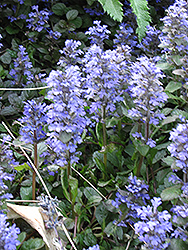It's all about ...
plants

Plant Height: 5 inches
Flower Height: 10 inches
Spread: 12 inches
Sunlight:
![]()
![]()
Hardiness Zone: 3a
Other Names: Geneva Bugleweed
Description:
A striking new true blue Ajuga that has thick dark green glossy foliage and amazing blue flowers; it will light up the floor of a garden like nothing else; vigorous and very cold hardy; excellent for containers, groundcover, and borders
Ornamental Features
Blue Bugleweed features dainty spikes of blue flowers with sky blue overtones rising above the foliage from mid spring to early summer. Its glossy oval leaves remain dark green in colour throughout the year.
Landscape Attributes
Blue Bugleweed is a dense herbaceous evergreen perennial with a ground-hugging habit of growth. Its medium texture blends into the garden, but can always be balanced by a couple of finer or coarser plants for an effective composition.
This plant will require occasional maintenance and upkeep, and should not require much pruning, except when necessary, such as to remove dieback. It is a good choice for attracting butterflies to your yard, but is not particularly attractive to deer who tend to leave it alone in favor of tastier treats. Gardeners should be aware of the following characteristic(s) that may warrant special consideration;
- Spreading
Blue Bugleweed is recommended for the following landscape applications;
- Border Edging
- General Garden Use
- Groundcover
Planting & Growing
Blue Bugleweed will grow to be only 5 inches tall at maturity extending to 10 inches tall with the flowers, with a spread of 12 inches. Its foliage tends to remain low and dense right to the ground. It grows at a medium rate, and under ideal conditions can be expected to live for approximately 10 years. As an evegreen perennial, this plant will typically keep its form and foliage year-round.
This plant does best in partial shade to shade. It does best in average to evenly moist conditions, but will not tolerate standing water. It is not particular as to soil type or pH. It is somewhat tolerant of urban pollution. Consider covering it with a thick layer of mulch in winter to protect it in exposed locations or colder microclimates. This species is not originally from North America, and parts of it are known to be toxic to humans and animals, so care should be exercised in planting it around children and pets. It can be propagated by division.
